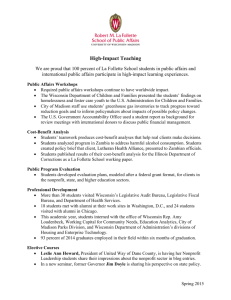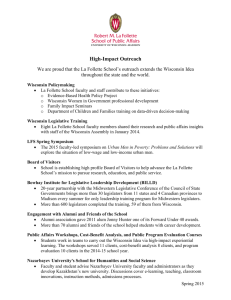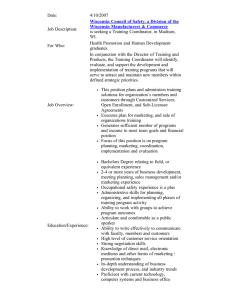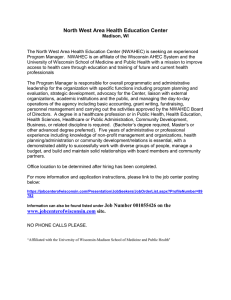tes Alumni No I
advertisement
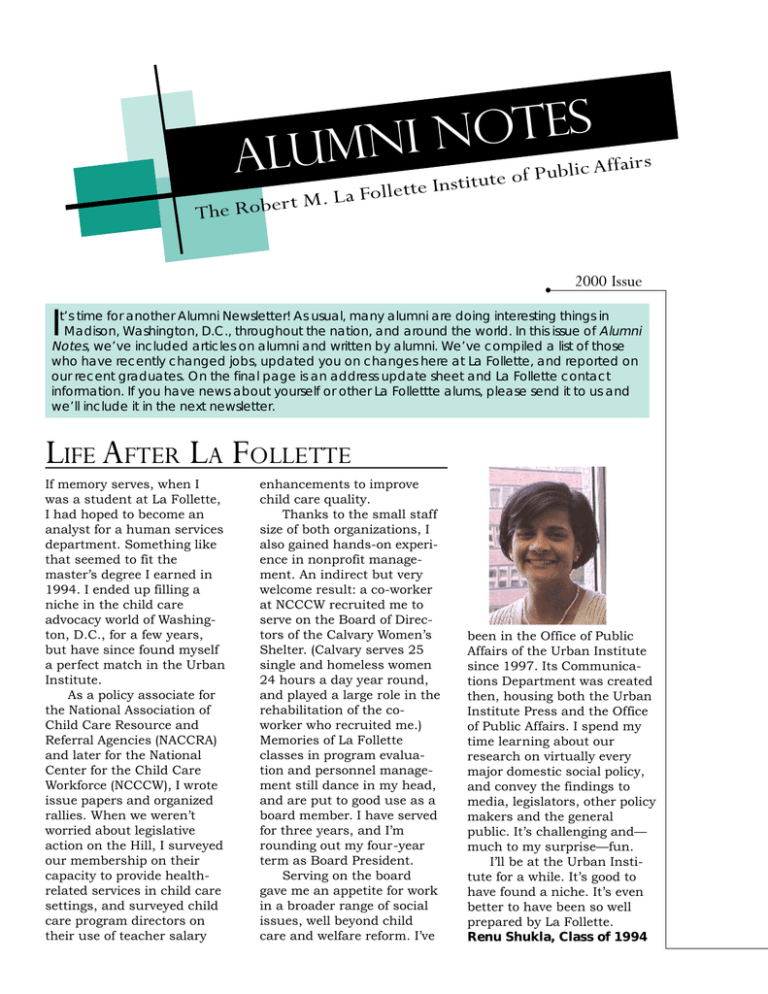
s e t o N i n m u l A lic Affair s b u P f o e t tte Institu tM The Rober . La Folle 2000 Issue I t’s time for another Alumni Newsletter! As usual, many alumni are doing interesting things in Madison, Washington, D.C., throughout the nation, and around the world. In this issue of Alumni Notes, we’ve included articles on alumni and written by alumni. We’ve compiled a list of those who have recently changed jobs, updated you on changes here at La Follette, and reported on our recent graduates. On the final page is an address update sheet and La Follette contact information. If you have news about yourself or other La Follettte alums, please send it to us and we’ll include it in the next newsletter. LIFE AFTER LA FOLLETTE If memory serves, when I was a student at La Follette, I had hoped to become an analyst for a human services department. Something like that seemed to fit the master’s degree I earned in 1994. I ended up filling a niche in the child care advocacy world of Washington, D.C., for a few years, but have since found myself a perfect match in the Urban Institute. As a policy associate for the National Association of Child Care Resource and Referral Agencies (NACCRA) and later for the National Center for the Child Care Workforce (NCCCW), I wrote issue papers and organized rallies. When we weren’t worried about legislative action on the Hill, I surveyed our membership on their capacity to provide healthrelated services in child care settings, and surveyed child care program directors on their use of teacher salary enhancements to improve child care quality. Thanks to the small staff size of both organizations, I also gained hands-on experience in nonprofit management. An indirect but very welcome result: a co-worker at NCCCW recruited me to serve on the Board of Directors of the Calvary Women’s Shelter. (Calvary serves 25 single and homeless women 24 hours a day year round, and played a large role in the rehabilitation of the coworker who recruited me.) Memories of La Follette classes in program evaluation and personnel management still dance in my head, and are put to good use as a board member. I have served for three years, and I’m rounding out my four-year term as Board President. Serving on the board gave me an appetite for work in a broader range of social issues, well beyond child care and welfare reform. I’ve been in the Office of Public Affairs of the Urban Institute since 1997. Its Communications Department was created then, housing both the Urban Institute Press and the Office of Public Affairs. I spend my time learning about our research on virtually every major domestic social policy, and convey the findings to media, legislators, other policy makers and the general public. It’s challenging and— much to my surprise—fun. I’ll be at the Urban Institute for a while. It’s good to have found a niche. It’s even better to have been so well prepared by La Follette. Renu Shukla, Class of 1994 Page 2 Alumni Notes NEWS FROM THE ALUMNI ASSOCIATION Hello Colleagues! It’s been an interesting and challenging year for the Alumni Association as we continue to work to build the organization. With the help of La Follette, we were able to organize a couple of events, as well as reestablish the annual scholarship presented to an outstanding student representing some of the ideals of Robert M. La Follette. The Alumni Association hosted two major alumni events this past year in Madison: a fall banquet at Monona Terrace and the Spring Fling, which we co-hosted with the La Follette Institute. We were also able to provide two scholarships to La Follette students: a graduating student, Wendy Kloiber; and a first-year student, Jessica Berger. The alumni board voted to establish a scholarship fund within our accounts, and are now accepting contributions from alumni interested in donating directly to this scholarship fund. Checks may be sent to the La Follette Alumni Association Scholarship Fund in care of the La Follette Institute, 1225 Observatory Drive, Madison, Wisconsin, 53706. Any amount is welcome, $50, $25, even $10. Don’t forget, it is tax deductible and it might help a deserving student buy his or her books one semester. Many of you may remember a survey we sent out last year to solicit more alumni input into activities you’d like to see. I won’t recap the results of the survey here as we sent a newsletter out last fall to explain, but I will say that we are busy trying to plan more informal events as many of you indicated you wanted. In addition, the La Follette Institute Student Association is working to create a mentoring program between female graduates and current female students. If you are interested in participating in this program, please e-mail me at MarciMccoy@aol.com. Finally, if you are interested in attending Alumni Association board meetings, we meet the last Tuesday of every month at the Wilson Street Grill at 5:15 p.m. We are trying to fill the last couple of positions on the board and are looking for enthusiastic candidates willing to make a oneyear commitment. We hope to see you at an alumni function this year! Marci McCoy (’97) Alumni Association Board Member The La Follette Institute Alumni Association cordially invites you to a Spring Fling The Great Dane Pub & Brewery Company Lower Level 123 East Doty Street Madison Thursday, April 13, 2000 4:30-6:30 p.m. $10 per alumnus/guest $5 per student RSVP phone: 263-2409 or e-mail: wong@lafollette.wisc.edu Page 3 Alumni Notes FACULTY AND STAFF UPDATES Craig Allan is La Follette’s new information processing consultant, replacing Kurt Sippel. Most recently, Craig worked at the UW General Library System, where he provided technical assistance to faculty, staff, and students at more than 30 libraries around campus. Joanne Chapin and Ann Chambers are the newest additions to our student services support team. They work together on recruiting, admissions, and advising. They came to La Follette from the Center for Development where they worked with international graduate students. Graham Wilson became the associate director of the Institute on June 1, 1999. Graham is also a professor in the Political Science Department. Jeffrey Bernstein teaches Quantitative Methods as well as Business and Government in the Global Economy. He received his Ph.D. from Harvard University in 1998. Sandra Hoffmann began teaching at La Follette in January 1999 after receiving her Ph.D. from the University of California, Berkeley. She teaches Cost Benefit Analysis and Environmental Policy. Kelly Chang came to La Follette in September 1998, after graduating from Stanford University. She teaches Quantitative Methods in the fall and Regulation of U.S. Economic Policy in the spring semester. Donna Wong became the Placement Coordinator in July 1998. An alum herself, Donna worked at the Legislative Fiscal Bureau and UW System Administration budget office before coming back to La Follette. Geoffrey Wallace has a postdoctoral fellowship at La Follette. He will be an assistant professor beginning in the fall of 2000 having earned his Ph.D. in economics from Northwestern University. John Witte, as of June 1, 1999, became the director of the Institute. CLEARY RETIRES AFTER 37 GLORIOUS YEARS January 27, 2000, marked the retirement of one of the La Follette Institute’s stabilizing forces. Bonnie Cleary, graduate student adviser at La Follette for 20 years, has decided to move on to bigger and better things. Her post-retirement plans include: golfing, volunteering, Internet-surfing, traveling, knitting and crafting, and helping her sister at Whispering Pine, a 100-year-old lodge near St. Germain, Wisconsin. Bonnie’s outstanding contributions were honored at her retirement party on January 27 at the Avenue Bar in Madison. Representatives of both her university and state government lives commemorated her achievements in the ceremony. In all, approximately 100 people attended the festivities. The La Follette staff serenaded her with “Leaving on a Golf Cart,” a parody of the similarly named song by Peter, Paul, and Mary. A current stu- dent representative gave a heartfelt thank you to Bonnie for her extraordinary support and advice. Family and personal friends also celebrated with her, including a touching speech from her son, Tim. As a thank you from faculty, staff, students, and alumni, Bonnie was presented with an impressive computer, printer, and software. During her own speech, Bonnie thanked everyone for making her retirement celebration truly memorable. She especially thanked the many students and alumni for such fond memories. “Thanks to all the alumni who have helped me over the years. I will miss you most,” were her exact words. Bonnie would love to continue to keep in touch with alumni. She can be reached at brcleary@facstaff.wisc.edu. Thank you for your contributions to her celebration. Page 4 Alumni Notes WHERE DID RECENT GRADUATES GO? 1998 Alice Shepard Maryland Legislature Budget Office Mary Healy Minnesota Deparment of Human Services Armando Mota Great Valley Center, Modesto, California Dan Buron Managment Analysis, Inc., Vienna, Virginia Kelly Flowers USAID/Honduras Heidi Normandin Center for Health Policy and Program Evaluation, UW–Madison Doug Conover Federal Reserve Board, Washington, D.C. Matt Cutler U.S. Department of Health and Human Services Ben Glispie Manpower Demonstration Research Corporation, New York Hannah Harris Wisconsin National and Community Service Board, Division of Community Development, Department of Commerce Jason Hanna UW–Madison Athletic Department Jennifer Kammerud School Administrators Alliance, Madison Lark Lee International Studies and Programs, UW–Madison Kendra Lodewick Berkeley Planning Associates, Oakland, California Anne McMahon Michael Blumenfeld and Associates, Madison Ken Moehringer New York State Division of Budget, Albany 1999 Veronica Robles City of Phoenix Steve Scott City of Long Beach, California Julie Shipe Village of Waunakee, Wisconsin Ayana Wayne Social Security Administration, Washington, D.C. Manyee Wong Wisconsin Department of Administration Michael Jacob Center on Wisconsin Strategy, UW–Madison Jean Prijatel Health Central RX.com, San Francisco Erin Kalinosky State Budget Office, Wisconsin Department of Administration Budget Josh Rosenbaum City of Long Beach (California) Managment Internship Sarah Keim National Institutes of Health, Bethesda, Maryland Faith Russell Wisconsin Legislative Fiscal Bureau Bill Burns Wisconsin Department of Health and Family Services, Bureau of Health Care Financing Wendy Kloiber Senate Democratic Caucus, Madison Bob Simi Assistant Manager, Village of Elm Grove, Wisconsin Tim Casper Office of U.S. Representative Tammy Baldwin Jolie Krasinski Openlands Project, Chicago Carrie Templeton Office of State Senators John Erpenbach and Alice Clausing, Madison Tamarine Cornelius Wisconsin Legislative Audit Bureau Kelli Marciel National Institutes of Health, Bethesda, Maryland Dawn Currier State Budget Office, Wisconsin Department of Administration Melissa Mullikin State Budget Office, Wisconsin Department of Administration Sean Dilweg Office of Wisconsin State Senator Robert Cowles Travis Myren Dane County Department of Administration, Madison Peter Ballard Chicago, Illinois Robert Blaine Wisconsin Department of Adminstration Budget Office Connie Buck Legislative Budget Office, Atlanta, Georgia Steven Drumm Alexandria, Virginia Kasia O’Neill California Legislative Analysts’ Office, Sacramento Kristin Voskuil Center for Health Systems Research and Analysis, UW–Madison Mitzy Wasco Affinity Health Systems, Menasha, Wisconsin Jason Witt State Budget Office, Wisconsin Department of Health and Family Services Page 5 Alumni Notes UPDATES Anne Anderson (’82) joined a start-up non-profit group that develops curriculum materials and does teacher training in the field of education technology. George Austin (’76) left his job as director of the City of Madison Planning Department in October 1998 and became the president of the Overture Foundation, the group formed to oversee use of the $100 million gift for an arts district in Madison. Earl Bricker (’97) is the executive director of ACHOICE in Milwaukee. Michael Bright (’90) has been successfully running his own government and public affairs consulting business for five years. Mark Cassell (’92) published a report (through Cleveland State University’s Urban Center) on wages in Ohio. Mark received his Ph.D. in political science from the UW–Madison and is an assistant professor at Kent State University. Bill Cosh (’93) left his lobbying position with the Wisconsin Association of School Boards to become a legislative service analyst with the Assembly Republican Caucus. Rob Cramer (’91) is now administrator of the Division of Agency Services in the Wisconsin Department of Administration after working for Arthur Andersen’s Government Services Group. Shelley Curran (’98) is working at the West Coast Office of the Consumer Union on the credit and finance team administering payday loans, check cashers, CRA agreements, bank mergers, and insurance. Kelly Flowers (’98) works at USAID/Honduras as a project development specialist to assist the mission with the redesign of its strategy and the development of reconstruction and economic reactivation projects (due to the effects of Hurricane Mitch). Hans Giesecke (’81) is president of Tennessee Independent Colleges and Universities in Nashville. Karen Goldman (’93) is the director of foundation and corporate relations at the Philadelphia Education Fund. Pat Hobbins-Kemps (’93) took a position as business director of the Blessed Sacrament Catholic Community in Madison. Kerry Holden (’94) left the Legislative Audit Bureau and is now an executive budget and policy analyst at the Wisconsin Department of Administration. Michael Jacob (’99) recently completed his duties at U.S. Senator Russell Feingold’s office and is now working at the Center on Wisconsin Strategy at UW– Madison. Jim Johnston (’89) is a budget and policy analyst at the State Budget Office in the Wisconsin Department of Administration. Mary Healy Jonas (’98) is a welfare policy analyst at the Minnesota Department of Human Services. Sarah Justus (’97) is in the Performance Evaluation Office in the Wisconsin Department of Administration. Brad Kelly (’93) is a rates analyst for the Minnesota Department of Public Service, within the Division of Energy’s Electric Unit. Keith Krinke (’90) was named chief of district operations at the Wisconsin Technical College Systems. Mary Lee (’95) took a position as director of community relations at Meriter Hospital in Madison. Matt Massman (’91) left the Wisconsin Legislative Audit Bureau to take a job as a fiscal analyst on the tax committee for the Minnesota House of Representatives. Marci McCoy (’97) is now at the Center for Delivery Systems Development at Pathways to Independence in Madison. Lauren McHargue (’90) is senior policy analyst for the Center for Economic Development at UW– Milwaukee. Theresa Mintle (’91) has been appointed program director at the Chicago Metropolis 2020, a non-profit organization addressing urban sprawl and development issues. John Norquist (’88), as mayor of Milwaukee, was named one of Governing Magazine’s 1998 Public Officials of the Year. Jon Reneau (’81) left UW System Administration to become a human resources officer at the Wisconsin Department of Health and Family Services. Kim Reniero (’95) moved from the Maximus consulting office in Milwaukee to their office in Washington, D.C. Randy Romanski (’95) moved from State Senator Alice Clausing’s office to policy analyst position in the Attorney General’s office. Shelly Schueller (’92) is working at the Wisconsin Department of Employe Trust Funds as an employee benefit plan policy adviser. Joy Tapper (’85) was recently promoted to executive vice president of Covenant Healthcare System, one of the largest integrated health care delivery systems in Wisconsin. David Tebo (’93) has been appointed village administrator for Greenville, Wisconsin. IN MEMORIAM Karl Buechner (’72) passed away March 2, 1999. Karl worked at UW–Madison’s Division of Information Technology. Page 6 Alumni Notes MARC ELLINGSTAD (97) After graduating from the La Follette Institute in May 1997, I was fortunate enough to find work as a Democracy/Governance Advisor at the US Agency for International Development office in Hungary. I had previously been a Peace Corps volunteer and Fulbright scholar in Hungary, so this was familiar territory for me. Most of my duties involve working with local governments, nonprofit organizations, and the Hungarian Ministry of Environment. I manage several projects, including a $1.5 million activity aimed at supporting social services and employment creation in Hungary’s poorer regions through nongovernmental organizations. I’m particularly proud of the fact that we are able to implement many of our programs though indigenous organizations, which tend to provide more developmental “bang for the buck.” Because we’re part of the embassy, I also write the occasional speech for the ambassador, who takes great interest in USAID’s projects here. Hungary is now a member of NATO and is a very strong contender for European Union membership (which will probably come in 2005). On the whole it has a rather impressive record in the economic and political transition. For average Hungarians, however, the past decade has been far from painless, with wages remaining at about $250 per month despite dramatic increases in productivity and price increases. Hungary’s overall success means diminishing returns when it comes to foreign assistance, and for that reason the USAID offices in Hungary were slated to be closed in September 1999. One of our major challenges here is trying to export the “lessons learned” in Hungary to other, less developed countries in the region, such as Romania and the Ukraine. My work in Hungary will now continue through September 2000 as I work both with USAID and with organizations that provide assistance. Since April 1997, I have directed the project’s $400 million financing plan and the district’s financial management. Over the past two years I have coordinated the project’s $47 million Certificates of Participation issuance and $126 million bond refunding. In addition to the financial management of the project, I also fiscally manage a nonprofit community program formed by the district to aid in the promotion of small, women- and minority-owned businesses connected in the Miller Park project. Before working on the Miller Park Project I served as a senior financial analyst for the cities of Milwaukee and Minneapolis. I also devoted several years to directing international development projects in West Africa for the Peace Corps and Agency for International Development and performed international economic research analysis for the International Bank for Reconstruction and Development in the U.S. State Department. JIM GULTRY (95) I was appointed chief financial officer of the Southeast Wisconsin Professional Baseball Park District, the Miller Park project, by their board of directors in April 1997. The Southeast Wisconsin Professional Baseball Park District is a special local unit of government created by Wisconsin state government to oversee construction of a new ballpark for the Milwaukee Brewers. The district consists of Milwaukee County, where Miller Park is located, and the four surrounding counties of Ozaukee, Racine, Washington, and Waukesha. The Miller Park project is a unique public-private partnership of numerous entities. The project’s co-owners are the Southeast Wisconsin Professional Baseball Park District and the Milwaukee Brewers Baseball Club. Editor’s Note: Since hearing from Gultry, he was awarded the 2000 Peace Corps Franklin H. Williams award. He received the award on February 24 in Washington, D.C. Congratulations, Jim! Gultry was also highlighted in a February 29 article in the Milwaukee Journal Sentinel. The article illustrates how Gultry has dedicated his life to community development through his work in both public and private sectors. Page 7 Keep Us Posted Alumni Notes Name (please print) Page 7 My WORK address is: o I’ve changed names since I graduated. When I attended La follette, my name was: Title Institution/Company My HOME address is: Department Street Apt. Street or P.O. Box City State Zip City State Zip Phone Fax Phone o Please send me a FREE copy of the 2000 Alumni Directory. E-mail address o I grant permission to publish the above information. o Please do not publish or otherwise disclose the above information, but keep it for your records and mailings. o Comments and/or other news: Please send address updates to: Publications, La Follette Institute, University of Wisconsin–Madison, 1225 Observatory Drive, Madison, Wisconsin, 53706. ************************************************************************************************************** Keep The Alumni Association Funded The La Follette Institute Alumni Associate would also like to take this opportunity to thank you for your thoughtful contributions in the past. We ask you to continue to demonstrate your commitment and remember us in your charitable giving in 2000. We are currently raising funds specifically for the La Follette Institute Alumni Association’s Student Scholarship Fund, which awards a scholarship each year to a deserving La Follette student. o I/we wish to join other alumni and friends in their commitment to the La Follette Institute Alumni Association and its programs. o Enclosed is my/our contribution to the Student Scholarship Fund of o$25 o$50 o$100 o$500 o$1000 oOther $__________ o My organization will match this gift; its form is enclosed. Please make checks payable to La Follette Institute Alumni Association Scholarship Fund and send to 1225 Observatory Drive, Madison, Wisconsin, 53706. Page 8 AMBASSADOR THOMAS LOFTUS RETURNS TO HIS ALMA MATER ture from 1977-1991, Loftus was the longest serving Speaker of the Assembly in the history of the state. In 1990 he was the Democratic nominee for governor of Wisconsin. As a consultant on developing democracies, Ambassador Loftus has assisted parliaments in Hungary, Thailand, Pakistan, Latvia, Turkey, and Macedonia. He is the author of The Art of Legislative Politics. Ambassador Loftus was born in Stoughton, Wisconsin, in 1945 and holds a master’s degree in Public Policy and Administration from La Follette. RETURN ADDRESS REQUESTED The Robert M. La Follette Institute of Public Affairs University of WisconsinMadison 1225 Observatory Drive Madison, Wisconsin 53706 On Tuesday, April 18, 2000, Thomas A. Loftus (’72) will be giving a talk sponsored by the La Follette Institute and the International Institute at UW– Madison. As a Distinguished International Visitor, his talk is entitled “The Case for Foreign Entanglements: The U.S. in Europe” and will be held at the Pyle Center’s Lee Lounge at 3:30 p.m. Loftus is currently Special Advisor in Washington, D.C. to the Director-General of the World Health Organization. Prior to this appointment in 1998, he served as United States Ambassador to the Kingdom of Norway (1993-1997). A member of the Wisconsin legisla-
